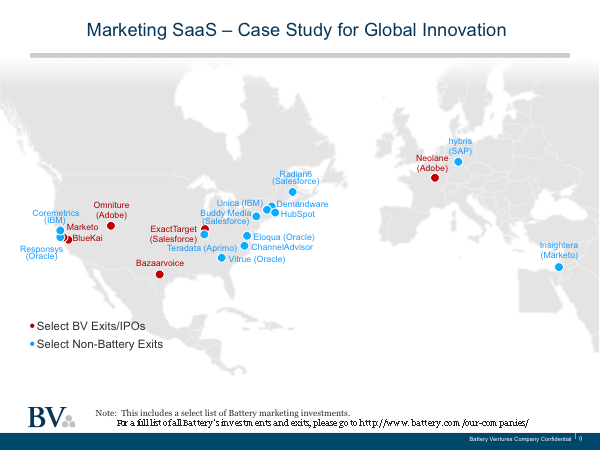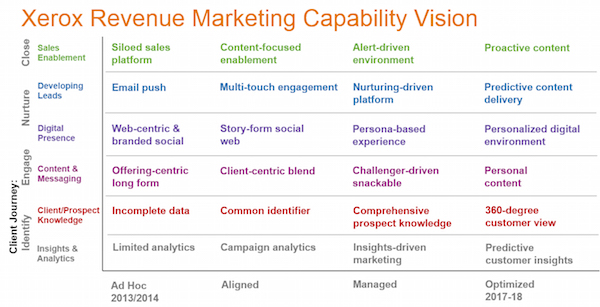Why is this man smiling?
Well, if your firm had invested in Omniture, ExactTarget, Marketo, BlueKai, Tealium, Sprinklr, Neolane, Optimizely, Bazaarvoice, BrightEdge, and a stack of other successful marketing technology companies, you’d be smiling too.
Neeraj Agrawal is a general partner at Battery Ventures, arguably the most active venture capital firm in marketing technology. I became aware of just how big of a footprint they have in this space when reviewing the data provided by VentureBeat that revealed $21.8 billion of funding invested in marketing technology to date.
According to the deal data tracked by VentureBeat, Battery Ventures had been involved in 39 marketing technology funding events, more than any other firm. And Neeraj was directly attached with a large number of those deals. When I publicly expressed an interest in talking with him, Erik Bratt, VP of content at Tealium, in which Battery has invested, kindly made the introduction.
Neeraj was kind enough to take some time to share his perspective of nearly 15 years of investing in some of the most innovative companies in marketing tech.
Can you tell us a little about your background? How did you get into venture capital?
My path to VC was totally accidental. I studied computer science at Cornell, and then came to Boston for my MBA. During my b-school summer, I worked in product management at Real Networks. After a fun summer, someone at Battery asked me to help him map out the “streaming media” space. Basically, Battery was looking for free labor. Video was just starting to happen on the Internet, and I thought this was the perfect way for me to identify a hot start-up to join in the streaming sector.
The project went well, but I didn’t find a start-up that resonated with me. Instead, Battery offered me a full-time position as a senior associate in March 2000. I thought I would spend a year or two at Battery until I found that magical start-up to join. But I really enjoyed the investment side. And it’s crazy to think I’ve now been here for almost 15 years!
Battery has been investing in the marketing technology sector for a long time. Can you share with us some of the history of your portfolio and the thesis behind it?
In 2001, Battery had a project to find “Internet” investments. It was still early days in the commercial Internet. We noticed the strong secular shift towards the Internet in media, commerce and communication. We kept hearing about online marketing and web analytics firm Omniture from all the companies we met. After an active pursuit, we invested in Omniture (acquired by Adobe) almost a decade ago.
That was our first martech investment, and since then we’ve been all over this space. We are fortunate to have backed Marketo (NASDAQ: MKTO), Exact Target (acquired by Salesforce), Bazaarvoice (NASDAQ: BV), BlueKai (acquired by Oracle), and Neolane (acquired by Adobe).*
Investing in this sector was a somewhat contrarian move when Battery first got involved. Marketing software did not command a large number of “seats,” or individual users.
So, why marketing tech? Investing in this sector was a somewhat contrarian move when Battery first got involved. Why? Quite simply, in the first few decades of enterprise software, marketing tech created minimal equity value for investors and founders. Marketing software did not command a large number of “seats,” or individual users, inside companies, as sales or customer-service technologies did. In addition, marketing was mostly a creative process, not a business process, so it was harder to automate.
However, the Internet changed everything. Once broadband became ubiquitous for consumers, buyers of all sorts of products began their education process on the Internet, not by walking to a physical retailer or dealer to learn about the latest products.
And as buyers moved to the Internet, marketing had to follow. As a result, Internet marketing was born, and more importantly, it became a brand-new business process. In fact, I’d argue it’s the only new business process created in the last 50 years. Other business processes, such as financial reporting, were automated by ERP systems starting in the 1960s.
Soon enterprises started hiring digital marketers to reach folks on the Internet. Our thesis then — and still today — is that digital marketers will purchase the best-in-class products to execute specific parts of this new business process. Omniture for Web analytics. Marketo for marketing automation. Bazaarvoice for user generated content. Sprinklr for social-media management.
Our thesis is that digital marketers will purchase the best-in-class products to execute specific parts of this new business process.
As an aside, in most software markets, start-ups face a structural disadvantage selling against the big enterprise suites such as Oracle and SAP. For example, it’s really hard for a start-up to sell a cool new general-ledger product — customers usually prefer an integrated financial suite from Oracle or Netsuite or Intacct.
However, in digital marketing, we believe marketers will pick the best product, even if developed by an emerging start-up. Why? If a product can improve conversion rates on a website by even a few percentage points, that represents a huge improvement. The digital marketer can take that incremental revenue and reinvest it in buying traffic from sites such as Google. (Ultimately we all live in Google’s world! God bless Larry and Sergey, as their PageRank innovation essentially catalyzed all of marketing tech.)
So, best-in-class products have a real chance in digital marketing. David can overcome Goliath. Start-ups can take on the software behemoths in marketing tech.
David can overcome Goliath. Start-ups can take on the software behemoths in marketing tech.
What about your current portfolio? What are some of the trends or patterns in marketing technology that you see across them?
In addition to our several exits, we have several promising companies in our current portfolio. BrightEdge is innovating in the SEO space. Sprinklr is growing quickly in enterprise social media management. Tealium is providing marketers with a new data access layer. SmarterRemarketer is enabling online retailers to respond in real-time to behavioral activity on websites, such as shopping cart abandonment.
They empower marketing agility — marketers can get things done without constantly involving or begging IT.
I’ve noticed a few trends amongst our fast-growing marketing tech companies. First, they empower marketing agility — marketers can get things done without constantly involving or begging IT. Second, they harness the power of the real-time web, such as real-time response to social media mentions or website personalization based on real-time actions. And third, they leverage big data to drive decision making. Insights across millions of user-generated reviews, or multivariate testing across lots of website visits, can yield extremely useful information for marketers.
Where do you think we’re at in the overall maturity of the marketing technology sector today? How much opportunity do you believe still remains for entrepreneurs entering the space?
This is a great question — the marketing technology LUMAscape, put together by LUMA Partners, highlights roughly a thousand vendors in marketing tech. Conventional VC wisdom would say this market is done, and it’s time to move on to the next hot sector. I totally disagree! I think we’re still in the early innings, maybe the fourth inning of this mega-trend.
I think we’re still in the early innings, maybe the fourth inning of this mega-trend.
Why? The commercial Internet is just 20 years old, if you consider the Netscape IPO the start of it. However, the mobile web is only seven years old (the iPhone launched in 2007). Seven years old! I believe mobile will reinvent marketing tech all over again.
At some large consumer-Internet companies I work with, mobile is almost 50% of traffic today. Fundamentally, digital marketers will need to embrace mobile just like they did the Internet 20 years ago. And that will create a huge opening for entrepreneurs to build next-gen, marketing tech companies.
Many marketers feel overwhelmed by all the new marketing technology these days. How do you think marketers can best harness all this innovation? What can marketing tech companies do better to help them?
Digital marketers indeed have their hands full. Integrating and working with dozens of vendors is a huge challenge.
One approach to simplify the complexity is for every major website to adopt a “tag management” strategy. Modern websites basically got built like a house without an architectural blueprint. I am convinced if we had to build the Web all over again today, we would start with a data-access layer on all websites. That would avoid the constant pain of bugging IT to add yet another tag to the website.
Imagine if Salesforce or Marketo did not have a well-defined API? That’s basically what has happened with websites. In fact, I’d argue websites are the only modern, mission-critical applications today that were designed without a data-access layer/API in mind. Tag management provides a critical abstraction layer for websites.
The work of a digital marketer is unfortunately never done. I see them struggling with two never-ending business goals: (1) driving more traffic to their websites, and (2) converting more traffic once on the site — whether that is a new lead-form being completed or an e-commerce transaction. Marketing technology actually helps on both these fronts. We invest in the shovels and picks to help digital marketers get their job done.
My advice to digital marketers is to trial lots of products and find the ones that make the cash register ring. There is no room for nice-to-haves.
My advice to digital marketers is to trial lots of products and find the ones that make the cash register ring. There is no room for nice-to-haves. The only thing entrepreneurs want is a shot to earn your business. They ultimately need you to be successful for their companies to be successful.
What do you look for in a marketing technology company that gives it the potential to become truly great?
Battery is a huge believer in marketing tech. In fact, more than 40% of all the software dollars invested in our two recent funds have gone into the martech space. I fundamentally believe it is the largest macro trend in application software today.
As an aside, some VCs argue that great companies can only be built in Silicon Valley. Battery has always been agnostic to geography — the digital marketer couldn’t care less where a vendor is headquartered. They simply want the best product! Accordingly, we’ve never hesitated to get on a plane and fly to places like Austin, Indianapolis, Paris, and New York to scout out potential new martech investments.
Don’t get me wrong — Silicon Valley is awesome too. My point is that martech innovation is happening across the country and in fact, globally.
See this map to get a sense of the geographic spread of martech innovation:
We hope to continue to partner with great entrepreneurs and help build the next generation of marketing technology leaders. Feel free to reach out to me on Twitter @NeerajVC if you want to continue this conversation. #MarTech. #innovation.
*For a full list of all Battery portfolio investments, please click here.
Thank you, Neeraj — both for taking the time to do this Q&A and being such a champion of marketing technology innovation!





Super Q&A Scott. “in digital marketing, we believe marketers will pick the best product, even if developed by an emerging start-up” – I see this daily.
Excellent article and well developed – good to hear that ‘martech’ is still only developing. I would say that ‘marketing intelligence’ is one of the last segments of BI yet to be conquered.
great interview Scott. some really good Q&A’s which really hit the nail on the head with where the segment is right now. particularly agree that marketers are overwhelmed and need to focus on the martech that delivers results.
Great interview. Thank you for all the great information from all the other blogs you write.